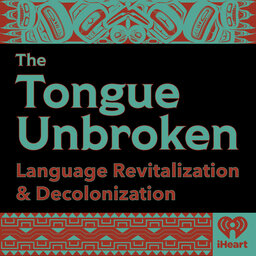We are joined by Yaayuk Bernadette Alvanna-Stimpfle, a high fluency first language speaker of Iñupaq, the director of the Kawerak, Inc. Heritage Program, and a doctoral candidate at Ka Haka ʻUla o Keʻelikōlani College of Hawaiian Language at the University of Hawaiʻi at Hilo. She shares her wisdom as an Indigenous language teacher, developer of teacher preparation methodologies, and as a member of the Alaska Native Language Preservation and Advisory Council. Her methodologies focus on safe learning environments and incorporating Indigenous language child rearing methods and love into language learning and use environments.
In 1 playlist(s)
Tongue Unbroken
The Tongue Unbroken (Tlél Wudakʼóodzi Ḵaa Lʼóotʼ) is a podcast about Native American language revita…Social links
Follow podcast
Recent clips

Coast to Coast: The Season Finale
1:00:07

Be the Change Agent of the Goal You Seek
55:51

Ḵúx̱de Kagux̱daháa: Landback, Languageback, Objectback
55:27
 Tongue Unbroken
Tongue Unbroken